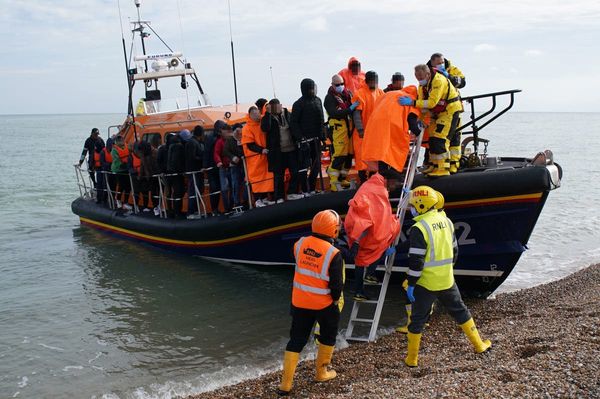
The head of the Scottish Refugee Council, Sabir Zazai, who arrived in the UK in the back of a lorry 23 years ago, has said Rishi Sunak’s illegal migration bill would have denied sanctuary to thousands of refugees such as him and Sir Mo Farah.
The home secretary, Suella Braverman, struggled to clarify on Wednesday whether the Olympic gold medallist Farah would have been deported as soon as he turned 18 years old under the latest immigration proposals.
But Zazai, who was presented with an OBE in January for his work, said the bill closed the door on the vast majority of refugees seeking safety today and historically.
Zazai, who had fled from Afghanistan, said: “There’s no regular route. If there was a regular route, I wouldn’t have risked my life and many other people will not risk their lives and the lives of their children.”
He added: “[This would have affected] all of us. Not just Mo Farah or me, but hundreds of thousands of people who fled and live their lives here. The friends, colleagues and neighbours, the people who have brought so much to this country, all of them would be affected.”
Pressure continues to mount on Sunak’s government after widespread condemnation of the proposals from national and international bodies. The United Nations refugee agency warned that the bill risked “extinguishing the right to seek refugee protection in the UK”.
Under the current system, to apply for asylum in the UK, applicants must be physically in the country. Last year 1,185 refugees were resettled to the UK, a 75% decrease from 2019.
Zazai said: “The refugee convention does not talk about people arriving with papers, passports and visas. It would leave people fleeing violent and oppressive regimes with no legal way to claim asylum. The UK does not have an asylum visa. It has no humanitarian protection or humanitarian corridors for people to seek protection here, apart from the Ukraine scheme and the very restrictive Afghan scheme.”
Only 22 refugees came to the UK on the Afghan citizens resettlement scheme. In the last year, more than 210,000 visas have been issued to people from Ukraine to travel to the UK. “Why don’t we see Ukrainians on the boats? Because there’s a safe passage for them,” Zazai said.
He said the lack of safe routes had long forced refugees to enter the UK through irregular means. “There’s no other way my family or the families of many other people that could come to the UK, from places like Afghanistan, Syria, Iran, Eritrea, and Sudan. Places that we know that there is still ongoing conflicts.”
Zazai said he was particularly alarmed by the impact the bill could have on those who, like Farah, fall victim to trafficking. “The trafficking element [in the bill] is horrendous. If a woman or a child who has been trafficked and sexually abused, and brought here to our country, and ends up on our shores, what do we say to them? Sorry, you’re not accepted. But if somebody is being trafficked from London to Manchester, then we have a provision for them. If somebody is trafficked across the Channel, we don’t. Is that right?”
Zazai said that while the bill targeted new asylum seekers, it would have a profound impact on Britain’s settled refugee community. “This bill is creating divisions and the government’s approach and narrative is creating divisions. It’s making the rest of us, people like me and many others, like second-class citizens. It’s undermining the journey that we’ve taken; it’s also overshadowing the great contributions that we’ve made. Whilst this is criminalising new people coming in, it’s criminalising the journey that we’ve taken as well.”
He added that, like many refugees on boats or in lorries, he arrived in the UK with hope and a dream. “I didn’t arrive in the back of a lorry as a chief executive of a major refugee agency with a strong voice and influence.
“But because of that right to protection that this government is literally deleting, I’m speaking with you and I’m making that difference. If that right is not there, then many people who are coming here will be denied that opportunity.”










